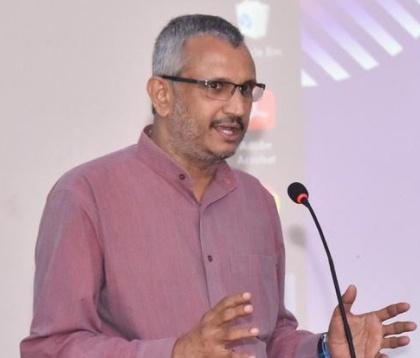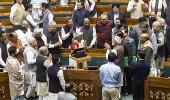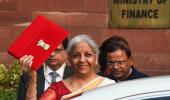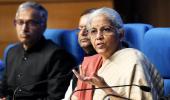'I am optimistic about the Budget because of the fiscal discipline the government has committed to.'

The growth rate of the Indian economy is slowing. Unemployment is going up. Consumption is going down. Inequality is going up.
It is against this backdrop that Finance Minister Nirmala Sitharaman presented the 2025 Budget.
And the narrative that is built by the income tax paying middle class of India is that the Budget will change the economy in a big way.
The question is, will the 2025 Budget make people consume more and revive the economy?
"Household finances are under stress and debt has increased. So, the moment people get income tax relief, it may be channelised for savings rather than consumption, and also to repay some of the borrowings. This is a possibility. If this happens, the kind of growth you are expecting because of higher demand, will not happen," Dr Suresh Babu, Director and Professor at the Madras Institute of Development Studies, tells Rediff.com's Shobha Warrier.
Because the finance minister increased the income tax limit, many hail the 2025 Budget as a 'people's budget'. But only 2.2% of the population pay income tax in India. Can you call this a 'people's budget'?
No. Just because she raised the income tax limit, you can't call it as a people's budget.
I would take a slightly broader view of the Budget.
The overall strategy is to increase demand in the economy at a time when the growth rate is actually slowing down.
There are some salient features in the economy which we have to keep in mind when we talk of this Budget.
1. It comes in the backdrop of a growth slowdown.
2. It comes at a time when the gross savings in the economy is not increasing.
3. Corporate earnings are not going at a faster pace.
4. Household debt is increasing, not at an alarming level compared to other countries, but it is increasing.
It is in this context that we have to see the Budget.

Do you feel the Budget addresses these issues?
Yes and no. It is crucial to have a demand revival at this stage of the economy.
There is a combination of strategies that has been used to revive demand.
One is providing relief measures to certain sections of the population who have some spending capacity but had a reduction in the disposable income in hands. By increasing the tax limit, it is expected to increase demand.
Second is, there is a kind of continuity in the relief measures like the PM Kisan, food grain distribution programme, housing scheme, etc.
All these put together, the expectation is that there will be a revival in demand.
Along with that is the continued push on capex.
But the government has been putting in capex every year expecting the private sector also to invest. But the private sector hasn't shown the confidence to invest in the market yet...
Yes, the problem we have been facing especially in the post-covid recovery phase is lack of private investment, be it infrastructure, be it manufacturing or any sector....
The basic groundwork in terms of infrastructure push is done by the government in every budget.
So, I would suggest that it is time we also take a very close look at the projects, their execution, delays etc before they pump in more and more capex into that. Until now, we are known for long delays in the execution of these projects. It is time to take stock of that.
The other point you have mentioned is very worrying. Even with all these measures from the government side, the private sector is not coming forward.
My thinking on that is, when you have a higher rate of return from the financial sector, there is a channelisation of all investments to the financial sector.
So, there is a need for some kind of a correction in terms of the returns from the real and the financial economy.
If you are investing in infrastructure or manufacturing, the gestation period is long, and a lot of regulatory mess has to be cleared. So, the private sector investment is channelised to just the financial sector. This has to be tackled.

IMAGE:Dr Suresh Babu
Is it not natural for the investors to invest in a sector that will give them more profit? How will you be able to tackle it?
The Economic Survey last year and this year also indicated some warning signals about the over-financialisaton of the economy. This has to be corrected at some point.
There is an IPO boom, and everyone is celebrating it. But what is the kind of net result of the investment? Where is it going? What is the kind of activity that is attracting investment? Is there employment generation?
All these have not been taken into account. The market is happy because new and new IPOs are coming, the IPOs are over- subscribed, and there is euphoria in the market.
I think the financial sector needs to look at some prudent measures. When I say, prudent measures, I am not talking about heavy-handed regulatory mechanisms.
There is a need for some correction in the activities of the financial sector. That has to be done. Otherwise, over time, this will become a bubble.

A bubble? Like 2008?
Not like 2008. I am worried because the global financial situation is also not very rosy with the kind of trade wars that are being started by Mr Trump's return to power.
So, we need to be a little careful about trade and finance, and have to have prudent measures in place.
When you talk about prudent measures, they can say, this is how a free-market functions...
Then the private sector should realise that there are no incentives and subsidies in the free-market!
When they should get out fully, it will be a totally free-market.
This is where they are being very clever. On one hand, they want all kinds of subsidies and on the other, they don't want regulation.
The Economic Survey also talks about this.
That's why I wrote, the journey in the industrial sector is from inspector raj to incentive raj.
You mean the incentive raj has to go now?
Yes, they have to decide about getting out also. Or, the private sector has to take up the responsibility of investing and taking it forward.
Even the government admits that the private sector is making profits, but the criticism is that the wages have been stagnant for so long. It means, only some people are making money, and making profits.
That's where the problem is. There is a kind of concentration of money in the market.
We see that certain firms and industrial houses are able to make money while a whole lot of others are just surviving.
That's where the product market reforms need to address. That is,
a. further opening up of more sectors
b. have some kind of anti-competitive measures in place.
In a free market, everyone talks about getting out. But they should also be able to accept a regulatory mechanism for the market to work efficiently.
Is this not aggravating the inequality that already exists in society?
That's a major worry. We find that the consequences of the kind of income distribution and sluggish wage growth is creating inequality.
This has implications in savings, investments, etc and in fact, it spills over into other activities and into the next generation also.
So, we have to see how we should tackle inequality now.
We know that in Economic Theory, the best way to tackle inequality is by providing employment opportunities.

The MSME sector is one sector that provides maximum employment, but its representatives are not happy with the incentives given for their recovery. Do you see a revival of the MSME sector happening?
The problem is the kind of approach we have towards the MSME sector. It has to be completely remodelled.
The present approach banks on finance alone under the belief that if you provide access to finance, everything is taken care of.
I have a different view. There is no doubt that access to finance is important. But that is only one of requirements.
There is also a need for access to the market, access to imports, access to technology...
We need to have a clear strategy to link the small with the large. That's the major industrialisation lesson from the South East Asian economies and the other parts of the world. And that's the approach we should also follow.
If there is only access to finance and there is no access to market or technology, the finance becomes a debt trap. That's exactly what is happening in India now.
I don't think the present Budget has a clear strategy in providing a package for MSMEs. When I say package, I mean a wholesome package.
Do you see any change in how people are going to consume?
I think we will have to wait and see. That's one of the reasons why the nominal GDP growth is slightly on the conservative side.
The government is also not sure about firing the economy upwards.
That's why they are working on a narrow base.
Household finances are under stress and debt has increased. So, the moment people get income tax relief, it may be channelised for savings rather than consumption, and also to repay some of the borrowings. This is a possibility.
If this happens, the kind of growth you are expecting because of higher demand, will not happen.
That's why the government has a conservative growth projection.
What about unemployment? Do you see any ideas in the budget to tackle it?
The Budget's approach to unemployment is to tinker certain industries like for example, the leather industry, toy manufacturing, etc. that absorbs labour.
I would have expected more push on textiles as it is very labour intensive. Also, there is a chance for India to encash on the uncertainties in Bangladesh.
Doing something for the textile sector would have helped create employment.
The second thing I would like to see is the stock taking of PLI (production linked incentive schemes).
We need a very realistic assessment of what it has been able to create in terms of employment as well as exports.
You have to assess it and then realign to where there is large employment generation.
Also, the Budget announcements need to be followed up with other policy measures.
The impetus has to come from following up on the Budget proposals.
It is important to stock take the announcements and proposals. For example, a lot of capex has been announced.
It is essential to find out where it is going, what is the progress and impact, etc.
During the era of Planning Commission, there used to be a mid-year review.

Do you think like the PM said, this Budget would fulfil people's dreams towards a Viksit Bharat?
That's a long journey.
My rough calculation shows that we will have to grow at the rate of 7.5% to 8% year after year for the next 22 years if we have to reach the higher per capita incomes of a developed country.
To maintain that kind of growth rate for 2 decades consistently, year after year after year looks like a difficult task.
It is also welcome if we can make some significant changes and move up in terms of per capita income.
For that, our focus should be on generation as well as distribution of income. Otherwise, the inequality problem will continue to be there.
Do you feel optimistic about the Budget?
I feel optimistic about a couple of things.
I feel optimistic about fiscal targets that was set in the Budget, as fiscal discipline is very important. Otherwise, the debt to GDP ratio will increase and it will lead to trouble. That's something the government has stuck to and it is a good thing.
The second important factor I am optimistic about is the commitment of the government to continue with some of the welfare schemes.
But I don't feel very enthusiastic about social spending, for example in education and healthcare. The government should have been spending more on school education.
Overall, I am optimistic about the Budget because of the fiscal discipline the government has committed to.
Are you optimistic about the economy performing well too?
We will have to wait and see how the economy will perform. Yes, the government is looking at a revival, but the extent of that revival depends on a number of factors, both domestic and global...
You will definitely need higher level of private investment for growth to happen now.
Photographs curated by Manisha Kotian/Rediff.com
Feature Presentation: Rajesh Alva/Rediff.com











 © 2025
© 2025